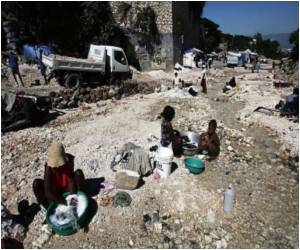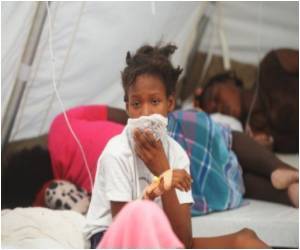A trio of health experts on Wednesday urged the United States to create a stockpile of vaccines against cholera, which has taken deadly hold in the impoverished and quake-hit Caribbean

"The costs to the US of creating and maintaining a stockpile of several million doses of cholera vaccine would be low," they wrote in a "perspective" article in the New England Journal of Medicine.
"But the humanitarian benefits of rapid deployment of cholera vaccines to areas at high risk for major cholera outbreaks -- such as earthquake-wracked Port-au-Prince, the Haitian capital where 1.3 million people live in unsanitary refugee camps -- could be enormous."
The letter was written by Matthew Waldor of Harvard Medical School, Peter Hotez of George Washington University and John Clemens, who is director of the IVI in South Korea.
Cholera, which causes potentially deadly cases of diarrhea, often strikes in poor countries where there is a high danger of an epidemic due to inadequate sanitation and limited access to clean water.
A sudden outbreak surfaced in Haiti last month and has killed 1,415 people, with around 56,000 infections recorded so far. Health experts say as many as 200,000 more cases could surface in the coming three months.
Advertisement
Three vaccines exist to protect against cholera, however manufacturers have fewer than 500,000 total doses on hand, the experts said, "making it impossible to consider large-scale vaccination of at-risk populations."
Advertisement
Having the drugs on hand could also help Washington "do its part to promote international stability and peace through vaccine diplomacy," the experts said.
In the absence of widespread immunity, the disease can travel quickly and requires treatment by hydration and antibiotics.
However both options present challenges in poor areas where there is little clean water and limited medical supplies.
Often, cholera exacerbates other problems, like civil unrest, hunger and poverty, so having a way to prevent it could show a wider impact on an already struggling population, according to Hotez.
"Outbreaks of cholera and other diarrheal diseases impede recovery from natural and man-made disasters," said Hotez.
"They also destabilize poor communities, promoting poverty by interfering with agricultural productivity and adversely affecting food security, and thereby potentially igniting new conflicts or exacerbating existing ones."
Cholera is believed to cause three to five million infections per year, killing an average of 100,000 to 130,000 people worldwide.
Source-AFP












